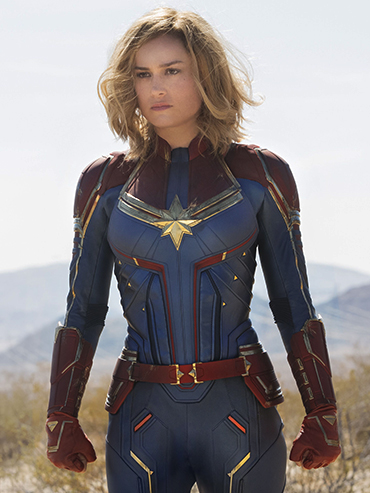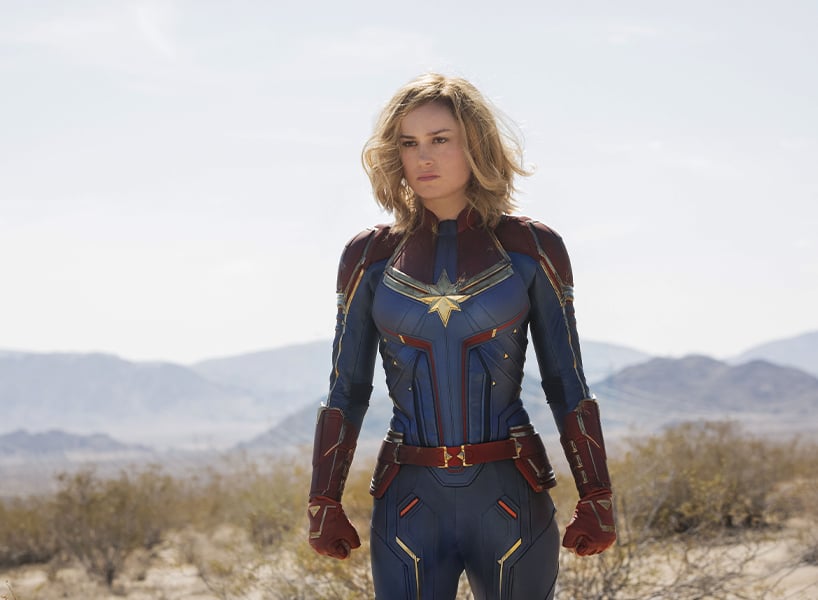I Can’t Stop Thinking About Captain Marvel’s Trauma
For starters, it feels real


On-screen, one of Captain Marvel‘s high-energy fight scenes is playing out and I can’t look away. “I’ve been fighting with one hand tied behind my back. But what happens when I’m finally set free?” Carol Danvers (Brie Larson) asks, before blasting the daylights out of her enemies to the tune of No Doubt’s “Just A Girl.” She’s finally unleashing her full powers after spending most of the movie struggling to come to terms with who she is—and what she’s capable of.
Off-screen, my heart is swelling with pride. I recognized Danvers’ unbridled euphoria at shedding trauma-induced self-doubt and finding her strength, and was so excited to it represented on the big screen.
There’s no doubt that Captain Marvel, the latest entry in the Marvel Cinematic Universe, has been a resounding success, earning $455 million worldwide in its opening weekend. Women across my social media feeds have been celebrating the movie for its parallels to our current, real-life struggle for gender equality. But there’s another aspect of this movie that deserves praise: It’s an insightful look into what trauma is, and how we can best respond to it and support survivors.
Captain Marvel treats Carol Danvers’ traumatic origin story as just that: traumatic
Trauma is something I’m deeply and personally familiar with. After I was diagnosed with Complex Post-Traumatic Stress Disorder last year, I spent months in therapy. Learning about trauma helped me to understand and overcome it, and a critical resource for me was Trauma and Recovery, by Dr. Judith L. Herman, an American psychiatrist specializing in the study of traumatic stress. She broadly defines trauma as the psychological response to violence and abuse, where our humanity is devalued and exploited by another party in their pursuit of power and dominance.
Captain Marvel shows trauma in its various forms, and that its effects don’t just go away—it’s a burden that we carry for the rest of our lives. It’s set in the middle of an intergalactic war where building power is the ultimate goal, so it’s not surprising that trauma plays a role in Danvers’ character development. But seeing my own experiences reflected back at me via her journey was still powerful. Violence and harassment had also muted my voice and minimized my personality. I, too, became a shell of my former self, unable to keep a regular appetite or sleeping pattern.
I saw my own struggle portrayed on-screen
While violence and trauma certainly aren’t new concepts to the Marvel Cinematic Universe nor mainstream media at large, the way Danvers’ struggle is portrayed is refreshing.
First, Yon-Rogg (Jude Law), a Kree Starforce Commander, shoots her plane down, then he murders her mentor. He turns his gun on Danvers, but after she’s knocked unconscious in an explosion, he realizes that she’s absorbed the source of power that he was after so he kidnaps her. In doing so, he discards her humanity, seeking to use her body as a tool to further his agenda of winning a war—a methodology he shares with real-life abusers and oppressors.
Then, Yon-Rogg separates Danvers from her Earth identity, modifying her memories to make her think she’s weak and submissive. He effectively grooms her into becoming a Kree soldier, and gaslights her into accepting that she would be nothing without him. When she exhibits classic symptoms of PTSD, including recurring nightmares of the accident, Yon-Rogg manipulates her further by saying she can’t control her emotions.
(I don’t have to remind anyone that “hysteria” is often used to discredit our experiences and discourage us from speaking our truths, do I?)
Danvers’ narrative arc is a realistic tale of recovering from trauma
In the recovery process, survivors are tasked with reconciling our pre-violence identity with who we’ve become in its aftermath. Dr. Herman outlines a three-step process in healing from abuse, which is centred on coming to terms with the narrative of our trauma. Danvers’ memory of her life on Earth is restored by the Skrulls, who have her virtually relive her past using their technology. By doing so, she’s able to understand her personal narrative and emboldened to further investigate what really happened to her.
Being able to establish our trust in our communities and loved ones once more, understanding that we are valued as individuals is yet another important part of recovering from abuse. It isn’t until Danvers finds her family that she’s able to truly reclaim her identity. Rediscovering her relationships with Maria and Monica Rambeau (Lashana Lynch and Akira Akbar) puts her back in touch with her humanity, validating her intuition that she’s strong, capable and powerful.
Finally, Danvers confronts Yon-Rogg and steps into the full extent of her powers. In what I see as a metaphor for smashing the patriarchy, Danvers uses her superpowered body to destroy Kree fighter jets and nuclear missiles, saving the world from destruction by her oppressors. She finally rejects Yon-Rogg’s mind games, declaring, “I have nothing to prove to you.”
At the end of the movie, I felt seen and empowered
Captain Marvel is a powerfully moving story about a survivor, a heroine who embraces her newfound identity. Although her humanity is exploited by power-hungry warmongers, what’s groundbreaking about this film is that Danvers refuses to see her victimization as a weakness, and instead uses this opportunity to break the cycle of violence and war.
As I reconnect with my voice through storytelling, both as the audience and the artist, I’m reminded of my own commitment to justice. Captain Marvel sets the example I needed to see to step into my own strength once again. Danvers chose to wield her powers with empathy and compassion, and to fight for a better and kinder world. After a long year of recovery, I realize that I’m ready to face my own battles, too.
Related:
Black Panther’s Superpower Is How It Diversifies Black Stories
A Trans Actor On What the First Transgender Superhero Means & What Still Needs to Change
Not All Comic Book Heroes Wear Capes—They Wear Hijabs Too








